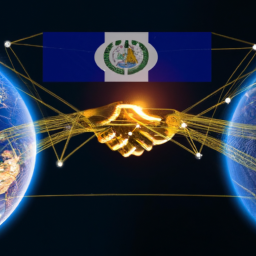Bitcoin Diplomacy: How Nations Like Pakistan and El Salvador Are Rewriting Global Financial Power Dynamics
Discover how cryptocurrencies are creating a new form of international relations as countries forge unprecedented alliances to bypass traditional financial systems and gain economic autonomy.

Bitcoin Diplomacy: How Cryptocurrency Is Reshaping International Relations
In an unprecedented shift in international financial relations, countries are increasingly turning to Bitcoin as a tool for diplomatic leverage and economic autonomy. The recent agreement between Pakistan and El Salvador represents a landmark case study in what analysts are now calling "Bitcoin diplomacy" – the strategic use of cryptocurrency to forge international partnerships and bypass traditional financial systems.
The Pakistan-El Salvador Bitcoin Alliance
The Pakistan-El Salvador deal marks a significant milestone in cryptocurrency adoption at the governmental level. El Salvador, which made Bitcoin legal tender in 2021, has shared its implementation expertise with Pakistan, a country facing persistent currency devaluation and limited access to global financial markets.
This partnership allows Pakistan to potentially circumvent traditional financial constraints while gaining access to El Salvador's established Bitcoin infrastructure and knowledge. For El Salvador, the alliance represents validation of its controversial Bitcoin strategy and extends its influence in the emerging field of cryptocurrency diplomacy.
Beyond Traditional Financial Systems
What makes Bitcoin diplomacy particularly significant is how it enables nations to operate outside the conventional financial order. Countries facing sanctions, currency instability, or restrictive monetary policies can utilize Bitcoin to:
- Reduce dependence on the US dollar for international settlements
- Mitigate the impact of financial sanctions imposed by Western powers
- Create alternative payment channels for bilateral trade
- Stabilize local currencies against inflation through Bitcoin reserves
The Global Implications
Bitcoin diplomacy represents more than just financial transactions – it signals a fundamental shift in how countries perceive monetary sovereignty. Several implications have emerged:
New power dynamics: Smaller nations like El Salvador have found unexpected leverage in the international arena by pioneering Bitcoin adoption. This creates new diplomatic openings previously unavailable to them.
Regulatory challenges: Traditional financial powers are scrambling to respond to these developments, caught between acknowledging cryptocurrency's growing legitimacy and concerns about reduced monetary control.
South-South cooperation: Emerging economies are increasingly sharing cryptocurrency knowledge and infrastructure, creating networks outside traditional Western-dominated financial systems.
Criticisms and Concerns
Not all observers view Bitcoin diplomacy favorably. Critics raise several valid concerns:
- Bitcoin's price volatility could expose national treasuries to significant risk
- The environmental impact of Bitcoin mining contradicts climate commitments
- Cryptocurrency could potentially facilitate illicit financial flows
- The technology gap may create new forms of dependency for less digitally developed nations
The Future of Bitcoin in International Relations
As more countries explore Bitcoin adoption at the governmental level, we can expect to see:
Regional Bitcoin blocs: Countries with shared economic challenges may form alliances centered around cryptocurrency adoption and infrastructure sharing.
Institutional responses: International financial institutions like the IMF and World Bank will likely develop more nuanced approaches to countries pursuing Bitcoin strategies.
New regulatory frameworks: International standards for cryptocurrency governance may emerge, potentially recognizing Bitcoin's role in cross-border relations.
The Bigger Picture
Bitcoin diplomacy represents more than just a technological trend – it reflects deeper changes in how nations perceive monetary sovereignty in the 21st century. As traditional financial systems face increasing scrutiny and technological disruption, cryptocurrency offers alternative pathways for international cooperation and economic development.
The Pakistan-El Salvador partnership may well be remembered as an early example of a much larger shift in how nations interact in an increasingly digital financial landscape. Whether this trend accelerates or faces setbacks will depend on Bitcoin's continued technological development, regulatory responses, and the real-world outcomes of these early diplomatic experiments.